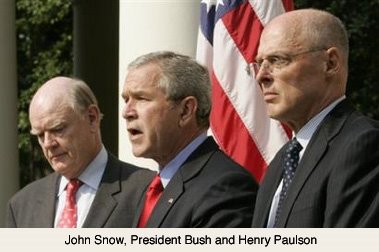Seanate majority leader Bill Frist, his presidential aspirations in tatters and aflame, has been trying to resurrect his hopes by addressing such pressing issues as gay marriage and the estate tax.
The former is doomed to defeat, as even supporters acknowledge, which exposes the "red meat for the base" motivation behind bringing it to the floor for a vote. But the latter is still alive.
GOP leaders on Tuesday put abolition of the federal estate tax on the Senate's election-year agenda as other senators weighed ideas to shrink, but not erase, the tax.
President Bush's tax cuts eliminated the estate tax in 2010, but that temporary law expires, and the tax comes back to life, one year later.
I always admired this cute provision, designed to mask the budget implications of repealing the estate tax while increasing the political pain of letting it be restored. It has done one thing, though: it's forcing Congress to find a more palatable permanent fix.
At least the discussion is moving away from outright repeal and toward some sort of compromise:
Kyl told other GOP senators Tuesday that common ground might be found by increasing the size of an estate exempt from taxation to $5 million per person or $10 million per couple, according to GOP aides familiar with the proposal speaking on condition of anonymity while negotiations continued.
His idea would tax estates between $5 million and $30 million equal to the top tax rate for most capital gains. The remainder of the largest estates would be taxed at 30 percent, those aides said.
That's better than an outright appeal, but I still have two reservations. One, how much will this reduce tax collections? And two, my main philosophical objection remains. Why this tax cut, and why now? There are at least two budget problems more pressing than the estate tax: the Alternative Minimum Tax, and the yawning budget deficits. The estate tax cut will make solving the other two even more difficult, and that just reveals majorly screwed up priorities. However unfair you think the estate tax is, the AMT is even more unfair. And on a purely practical level, the AMT increasingly affects people who need the money, unlike the estate tax. And the deficit is a bouquet of dead roses that we're passing on to our children, regardless of their ability to pay.
Congress needs to prioritize, and shelve the estate tax until they address more pressing concerns.
Update: As expected, the Senate has rejected the gay-marriage ban.
gay marriage, estate tax, Frist, politics, midtopia

